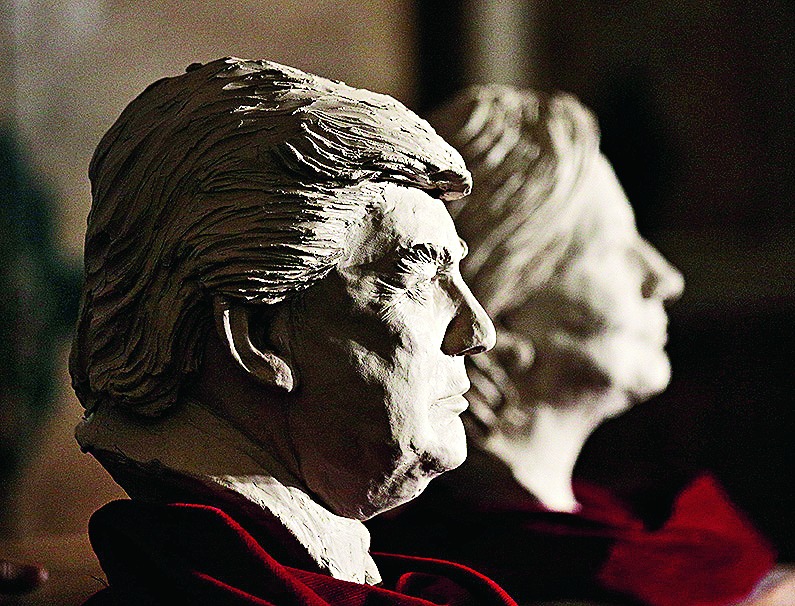
If Narendra Modi in his present avatar were a candidate for the Republican presidential nomination, he would be running from the centre of the field. He would be Jeb Bush without the charisma bypass. Certainly Ted Cruz would outflank him on the Right: besides being anti-immigrant and a climate change denialist, Cruz makes a habit of hosting gun events at shooting ranges after gun massacres. Compared to the things Ben Carson and Donald Trump routinely say about American minorities, the prime minister's insinuations about Muslims during the Bihar campaign seem mealy-mouthed, almost politically correct in their indirection and covertness.
You could argue that Donald Trump and the Seven Dwarfs haven't had a violent pogrom happen on their watch and without that on their political résumé, they have to vocalize their bigotry to persuade the Republican base of their conservative credentials. But even allowing for that handicap, Trump has been racist and communal with a freedom and, yes, flair, that Amit Shah must envy.
He has described Mexican migrants as rapists, suggested on Twitter that more than eighty percent of murdered whites are killed by blacks, proposed that all Muslims should be registered on a national data base, that mosques should be closed, water-boarding reinstated and recommended that the families of terrorists should be 'taken out'. And this is just a selection from his many provocations.
Ross Douthat, New York Times columnist and social conservative, conceded that there was something fascistic about Trump but suggested that he was unlikely to win the nomination because he wasn't a true conservative. He wasn't religious (except in an opportunist way), he had frequently criticized the Iraq War, nor was he economically libertarian; it was unlikely that he would be able to win over enough of the Republican electorate to secure the nomination. David Brooks, another conservative columnist, agreed, arguing that the appeal of maverick candidates tended to fade as the time to vote approached.
Even as conservative commentators and Republican strategists emphasize the improbability of a Trump nomination, they simultaneously advise the Republican Party and its more mainstream candidates to 'borrow' Trump's themes shorn of his provocations because they speak to 'real' concerns that the Republican base feels are unaddressed by the Republican establishment.
Douthat suggested that the Republican party needed to follow Trump in the way in which he had tapped into "the deep disaffection with the Republican Party's economic policies among working-class conservatives, the reasonable skepticism about the bipartisan consensus favouring ever more mass low-skilled immigration, the accurate sense that the American elite has misgoverned the country at home and abroad."
Ward Baker, a republican strategist, advised Republicans contesting Senate seats to follow Trump's lead about trade (especially with China) and immigration because it connected with working-class voters, but to do so without sounding extremist. He wanted them to "stake out turf in the same issue zone".
These two beliefs, one, that Trump's lead in the polls can't last and two, that the Republican Party can learn from his early success and harness his populist ideas in the cause of a less whacky, more plausible candidate, are both based on the idea that the Republican base's support for Trump stems from a set of rational grievances that establishment politicians have failed to address. So, once mainstream candidates like Cruz and Rubio begin to address them, they will rise and Trump will fade.
The trouble with this assumption is that candidates like Rubio, Cruz and Fiorina have ticked every conservative box without making any ground in the polls. They are all vehemently anti-immigration, specifically anti-Syrian-Muslim immigration, pro-choice, pro-gun, ostentatiously Christian, anti-Obamacare and against gay marriage. Donald Trump still tops the pre-primary polls with more than thirty per cent of the Republican vote.
And the reason he has a third of the vote with so many candidates still in the fray is not despite but because of his public bigotry, his willingness to channel pent-up prejudices normally constrained by political correctness. The people who support Trump aren't galvanized by the 'issues' that Douthat and Baker want the Republican Party to incorporate in its agenda; these issues are already hardy staples of Republican politics. They support Trump because public bigotry is his secret sauce. Everyone in the field is offering them meat and potatoes; what they like about Trump is that he serves up the meal with a rare and pungent mustard: brazen prejudice.
Over the past twenty years it has become apparent that the Republican base is overwhelmingly white, belligerently Christian and increasingly at odds with a diverse country. Immigration, the collapse of manufacturing, unemployment, Islamist violence and the culture wars about abortion and gay marriage have contributed to this sense of siege, but this beleaguerment is more than the sum of its parts. It is the distempered angst of a white rump that 'wants its country back'. There used to be a BJP-inspired slogan that began circulating in India in the late Eighties, garv se kaho, hum Hindu hain, which, freely translated, meant, "Say you're Hindu, say it with pride." Trump is the living embodiment of that feeling transposed to Tea Party America.
There were clear signs of this angst in the response of the Tea Party to Obama's presidency, especially the derangement of 'birtherism' and the idea that Barack Hussein Obama was a Muslim Trojan horse. Trump's poll numbers have helped make this white nativism visible. They have shown how enthused the Republican base is by public bigotry, and how strongly its resentment of America's diversity shapes its political preferences. Trump's rhetoric didn't create this constituency; it galvanized it.
Both in India and the United States, the last twenty-five years have seen the consolidation of a majoritarian base that accounts for a substantial fraction of the electorate. The BJP won the 2014 general election with nearly a third of the votes cast. This was a famous victory, but the party's more significant achievement is that even in bad times it manages more than twenty per cent of the national vote. This base, like the Republican base, is enthusiastically majoritarian. The reason the BJP's cadres were so keen that Modi be nominated as the BJP's prime ministerial candidate was because they knew that he would enthuse the base. And he did; Modi helped the BJP win the general election because people believed that he was a Hindu strongman who would set India to rights. Trump trades upon exactly that impulse; instead of Modi's record in office he offers his business savvy and his billions and he promises Republican rank-and-file a restoration. 'We'll make American great again!'
The media's focus on politicians of the radical Right like Modi and Trump (or Marine Le Pen) is understandable. They are flamboyant and newsworthy figures. But their real significance is that in republics that claim (in their different ways) to be secular, their message resonates with a large section of the electorate defined by majoritarian resentment. Their election campaigns make the strength of this prejudice visible; the point is that it flourishes independently of them. It's not Donald Trump that's the problem; the problem is the bigotry that makes him possible.
mukulkesavan@hotmail.com










